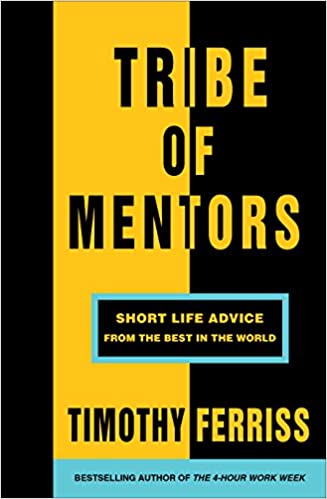Tribe of Mentors: Short Life Advice from the Best in the World – Tim Ferriss

“Tribe of Mentors: Short Life Advice from the Best in the World features interviews with a diverse group of over 100 successful individuals, including athletes, entrepreneurs, writers, and artists. In each interview, Ferriss asks a series of questions about their habits, routines, beliefs, and advice for living a fulfilling life.
The importance of saying no
Many successful individuals credit their success to being selective with their time and resources. Saying no to distractions, unimportant commitments, and opportunities that don’t align with your goals can free up space for more meaningful endeavors. Prioritizing what truly matters allows you to focus on what you are best at and what makes you happiest.
The power of networking
Building and nurturing relationships with others can open doors to new opportunities and ideas. Successful individuals prioritize networking by seeking out mentors, building strong relationships with colleagues, and maintaining a strong online presence. It requires a willingness to connect with others and to offer value in return.
The importance of continuous learning
Learning new skills and acquiring knowledge is essential for personal and professional growth. Successful individuals prioritize continuous learning by seeking out new challenges, pursuing education and training opportunities, and reading widely. It requires a growth mindset and a commitment to ongoing self-improvement.
The value of taking risks
Taking risks can lead to great rewards, both personally and professionally. Successful individuals prioritize taking calculated risks by being open to new opportunities, embracing uncertainty, and accepting failure as a potential outcome. It requires a willingness to step outside of your comfort zone and embrace the unknown.
The benefits of meditation
Many successful individuals credit meditation as a tool for managing stress, increasing focus, and cultivating a sense of inner calm. Regular meditation practice can help to reduce anxiety and improve emotional regulation. It requires a commitment to daily practice, even if just for a few minutes a day.
The power of gratitude
Practicing gratitude can have profound effects on mental health, relationships, and overall well-being. By intentionally focusing on the good things in your life, you can shift your mindset towards positivity and resilience.
Cultivating a daily gratitude practice, such as writing in a gratitude journal or expressing appreciation to loved ones, can help to reframe challenges as opportunities for growth and learning.
The importance of sleep
Prioritizing sleep is crucial for overall health and well-being. Getting enough quality sleep can boost cognitive function, improve mood, and reduce the risk of chronic health conditions. Successful individuals prioritize sleep by establishing consistent sleep schedules, creating a sleep-conducive environment, and minimizing disruptions to their sleep routine.
The benefits of exercise
Regular exercise is essential for physical and mental health. It can improve cardiovascular health, boost mood, and reduce stress. Successful individuals prioritize exercise by scheduling it into their daily routine, finding activities they enjoy, and focusing on consistency rather than intensity.
Embrace failure
Many successful individuals have experienced setbacks and failures on their path to success. Rather than seeing failure as a negative, they view it as a necessary part of the learning process. Embracing failure means taking risks and being open to experimentation and growth. It requires a willingness to learn from mistakes and to persevere in the face of obstacles.
The value of curiosity
Curiosity is a key trait among successful individuals, as it drives a desire to learn and explore new ideas. Embracing curiosity means being open-minded, asking questions, and seeking out new experiences. It requires a willingness to challenge assumptions and to think critically about the world around you.

